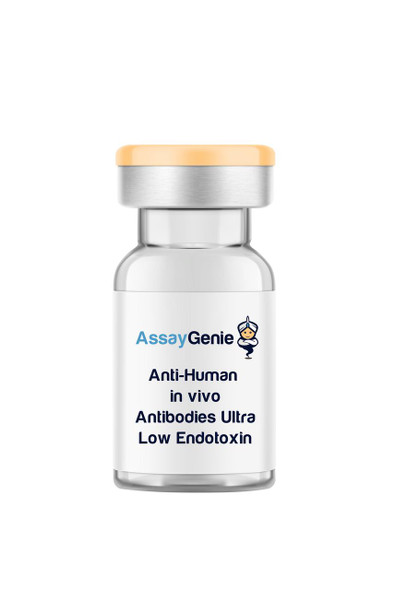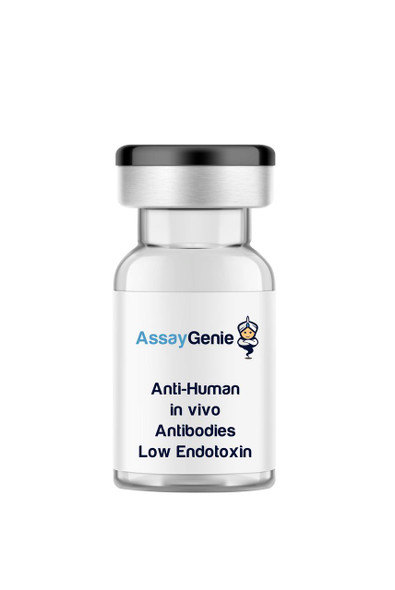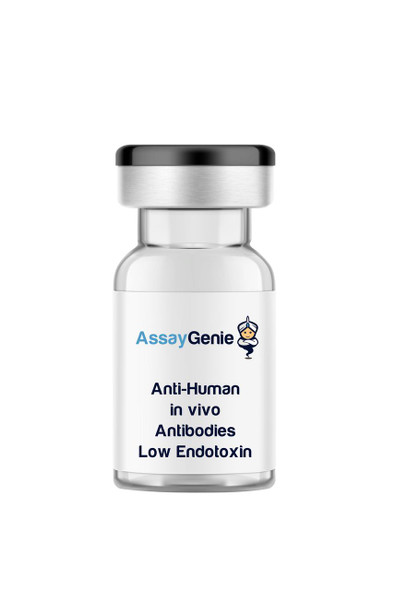Anti-Human Fibulin-4 [5G11] In Vivo Antibody - Low Endotoxin
- SKU:
- IVMB0128
- Product Type:
- In Vivo Monoclonal Antibody
- Clone:
- 5G11
- Protein:
- Fibulin-4
- Reactivity:
- Human
- Synonyms:
- EFEMP2
- Synonyms:
- ARCL1B
- Synonyms:
- FBLN4
- Synonyms:
- FIBL-4
- Synonyms:
- fibulin 4
- Synonyms:
- MBP1
- Synonyms:
- UPH1
- Synonyms:
- EGF containing fibulin like extracellular matrix protein 2
- Endotoxin Level:
- Low Endotoxin
- Host Species:
- Mouse
- Applications:
- IF Microscopy
- Applications:
- IF Staining
- Applications:
- IHC FFPE
- Applications:
- WB
Description
| Product Name: | Anti-Human Fibulin-4 [5G11] In Vivo Antibody - Low Endotoxin |
| Product Code: | IVMB0128 |
| Size: | 1mg, 5mg, 25mg, 50mg, 100mg |
| Clone: | 5G11 |
| Protein: | Fibulin-4 |
| Product Type: | Monoclonal Antibody |
| Synonyms: | EFEMP2, ARCL1B, FBLN4, FIBL-4, fibulin 4, MBP1, UPH1, EGF containing fibulin like extracellular matrix protein 2 |
| Reactivity: | Human |
| Immunogen: | Recombinant, human Fibulin-4 produced in E. coli BL21 cells. |
| Applications: | IF Microscopy, IF Staining, IHC FFPE, WB |
| Formulation: | This monoclonal antibody is aseptically packaged and formulated in 0.01 M phosphate buffered saline (150 mM NaCl) PBS pH 7.2 - 7.4 with no carrier protein, potassium, calcium or preservatives added. |
| Endotoxin Level: | < 1.0 EU/mg as determined by the LAL method |
| Purity: | ≥95% monomer by analytical SEC >95% by SDS Page |
| Preparation: | Functional grade preclinical antibodies are manufactured in an animal free facility using only In vitro protein free cell culture techniques and are purified by a multi-step process including the use of protein A or G to assure extremely low levels of endotoxins, leachable protein A or aggregates. |
| Storage and Handling: | Functional grade preclinical antibodies may be stored sterile as received at 2-8°C for up to one month. For longer term storage, aseptically aliquot in working volumes without diluting and store at -80°C. Avoid Repeated Freeze Thaw Cycles. |
| Applications: | IF Microscopy, IF Staining, IHC FFPE, WB |
| Recommended Usage: | WB The suggested concentration for this Fibulin-4 (Clone 5G11) antibody for use in western blotting is 1-10 µg/ml. |
| Reactivity: | Human |
| Host Species: | Mouse |
| Specificity: | Clone 5G11 recognizes Human Fibulin-4. Monoclonal antibodies raised against the purified proteins did not show any crossreactivity with other family members. |
| Antigen Distribution: | Fibulin-4 is predominantly expressed in tissues rich in elastic fibers. |
| Immunogen: | Recombinant, human Fibulin-4 produced in E. coli BL21 cells. |
| Concentration: | ≥ 5.0 mg/ml |
| Endotoxin Level: | < 1.0 EU/mg as determined by the LAL method |
| Purity: | ≥95% monomer by analytical SEC >95% by SDS Page |
| Formulation: | This monoclonal antibody is aseptically packaged and formulated in 0.01 M phosphate buffered saline (150 mM NaCl) PBS pH 7.2 - 7.4 with no carrier protein, potassium, calcium or preservatives added. |
| Preparation: | Functional grade preclinical antibodies are manufactured in an animal free facility using only In vitro protein free cell culture techniques and are purified by a multi-step process including the use of protein A or G to assure extremely low levels of endotoxins, leachable protein A or aggregates. |
| Storage and Handling: | Functional grade preclinical antibodies may be stored sterile as received at 2-8°C for up to one month. For longer term storage, aseptically aliquot in working volumes without diluting and store at -80°C. Avoid Repeated Freeze Thaw Cycles. |
There are currently seven genes in the fibulin family (Fibulin-1, 2, 3, 4, 5, 6, and 7) that are associated with elastic fibers. The fibulins are widely distributed throughout the body and are more prominent in tissues rich in elastic fibers and are often associated with vasculature and elastic tissues. Fibulin-4 appears to be the most critical member of this family of proteins in modulating elastic-fiber formation because studies have shown that fibulin-4-null mice do not produce elastic fibers at all.1 This extracellular glycoprotein has a molecular weight of approximately 49 kD, and is not only considered a structural protein of the extracellular matrix, but also a regulatory factor required for normal elastin expression in human fibroblasts.2 Due to the regulatory role of Fibulin-4, it is thought that a pathophysiological link may exist between the modulation of fibulin-4 levels and diseases, such as WBS (Williams-Beuren syndrome), that are characterized by impaired elastic-fiber formation.1 Furthermore, fibulin-4 has been shown to interact with P53, a crucial homologous protein that prevents cancer formation, and thus functions as a tumor suppressor.3 One study indicated that colon tumors were found to have approximately 2-7-fold increases of fibulin-4 mRNA expression. This suggests that the dysregulated expression of the fibulin-4 gene is associated with human colon tumourigenesis.4
| Technical Datasheet: | View |
| Protein: | Fibulin-4 |
| Research Area: | Immunology, Stem Cell |
Meet the team!
Shane Costigan
Territory Manager & Team Lead
Abdul Khadim
Sales Executive

![Anti-Human Fibulin-4 [5G11] In Vivo Antibody - Low Endotoxin Anti-Human Fibulin-4 [5G11] In Vivo Antibody - Low Endotoxin](https://cdn11.bigcommerce.com/s-rd6ounxcu2/images/stencil/608x608/products/78774/83956/anti-human-fibulin-4-5g11-in-vivo-antibody-low-endotoxin__88058__68797.1706545351.jpg?c=1)




